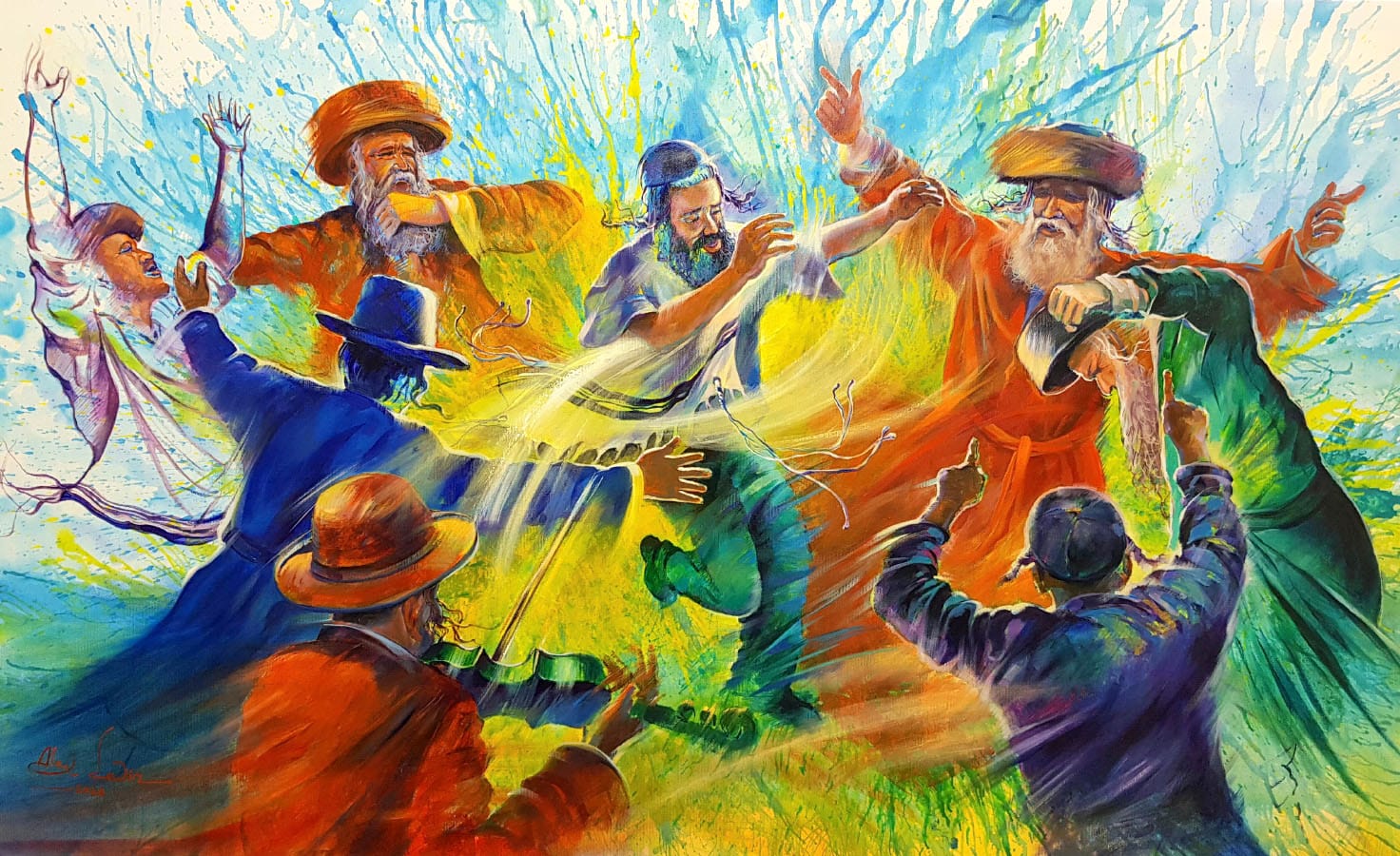What Makes You Happy?

Rav Tzvi Yehuda Kook once related a conversation that he had with Rav Mordechai Shmuel Kroll, the Rav of Kfar Chassidim: (שיחות הרב צבי יהודה – מועדים א, עמ' 319).
While growing up in Europe, Rav Kroll had been a Chossid of Reb Leibele Eiger in Lublin. Reb Leibele was well known to spend many hours in preparation for doing any mitzvah, and certainly for davening. And so it was, that one Yom Kippur night, the Chassidim waited until 11pm before beginning Kol Nidrei.
Rav Kroll turned to Rav Tzvi Yehuda and asked: “What do you think we did while we waited?”
Rav Tzvi Yehuda replied: “Most likely, those who could learn Gemara, spend their time learning Maseches Yoma. Perhaps some learned Mishna, and those who couldn't learn said Tehillim?”
Rav Kroll answered: “You don't understand Chassidim at all! For five hours we sang and danced! And do you know what we sang?”
“Perhaps the words that Chazal say were sung in the Beis HaMikdash on Sukkos: אַשְׁרֵי מִי שֶׁלֹּא חָטָא, וּמִי שֶׁחָטָא — יָשׁוּב וְיִמְחוֹל לוֹ – Happy is one who hasn't sinned, and one who has should do Teshuva and be pardoned?”
Once again Rav Kroll responded: “You still don't understand Chassidim!” He continued, “the great principle of Chassidus is to serve Hashem with joy. Being that Yom Kippur requires the highest level of Avoda, it must begin with the greatest joy. For five hours, hundreds of us danced and sang the Purim song, Shoshanas Yaakov!”
I'm not sure how many of us are looking for such a Yom Kippur experience. Mind you, our hesitation with this type of Yom Kippur is not just because our emotions on Yom Kippur are usually more sobering. Many would have a hard time doing this on Purim. For most of us, it's hard to imagine being so thoroughly “into it” for such an extended period of time.
A few weeks ago, there was a Yid told me honestly that dancing on Simchas Torah for more than a few minutes was mind-numbingly boring to him. He asked if we could perhaps go back to the abridged Hakafos of COVID?
While I appreciated the honestly, it saddened me to hear it. We cannot mandate religious exuberance, but Moshe Rabbeinu this Shabbos, reveals the result of a Yiddishkeit devoid of Simcha.
Deep in the painful pesukim of the Tochacha, we discover the central reason for our exile and persecution:
תַּחַת אֲשֶׁר לֹא־עָבַדְתָּ אֶת־ה' אֱלֹקיךָ בְּשִׂמְחָה וּבְטוּב לֵבָב מֵרֹב כֹּל
Because you did not serve Hashem, your God in joy and gladness over the abundance of everything.
The end of the Pasuk – “מֵרֹב כֹּל” – seems unnecessary. Ostensibly, we are punished for failing to serve Hashem with joy. What need is there to add “over the abundance of everything”?
The simplest reading of this pasuk is that as a result of the many blessings Hashem had given to us, we became spoiled. In order to return us to the simple joy of Yiddishkeit, Hashem will take away those pleasures which ruined us.
Perhaps this is a piece of the story, but the Sfas Emes (כי תבא תרמ”ג) quotes from the Arizal that there is far more going on here:
מרוב כל: להיות שמח בעבודת הש”י יותר מכל מיני טוב שבעולם
The words “מרוב כל” mean that we are to be happier with serving Hashem than the happiness we experience from all the other good in the world.
The central question of Jewish life is: What brings you the most joy? A life of service or a life of stuff?
The Torah is setting up a comparison, a hierarchy of Simcha. Moshe Rabbeinu is telling us that there is nothing wrong with enjoying physical pleasures. There is nothing problematic with enjoying good food, sleeping in a comfortable bed, and taking full advantage of our material success.
Indeed, the pasuk in our Parsha (כו:יא) tells us:
וְשָׂמַחְתָּ בְכׇל־הַטּוֹב אֲשֶׁר נָתַן־לְךָ ה' אֱלֹקיךָ וּלְבֵיתֶךָ
And you should enjoy all the bounty that Hashem your God has given to you and your household...
Yet, in a profound and painful way, the Torah is telling us that equating our pursuit of happiness with our pursuit of “things” is a recipe for sadness, brokenness and destruction.
The Torah is not advocating a life of asceticism and abstinence. There is no inherent value in deprivation. But there is most certainly a value in aligning our priorities so that we find our greatest enjoyment in purpose rather than in possessions.
I dare say, but this is a radical departure from most of our religious experience and aspiration. Especially as we approach the Yamim Noraim, we are conditioned to think of this season as being filled with obligations. Of course, this is true. We cannot escape the reality that Hashem has expectations of us. The Shulchan Aruch is replete with details discussing how exactly to ensure that we are in fulfillment of our obligations.
But how tragic would it be if we never succeeded in transcending the obligations to truly enjoy these moments of closeness and engagement with Hashem? Is it not the height of dysfunction for partners in a relationship to dread the time they spend together? To view each others' presence as a chore?
Imagine a couple coming home from a date night, and one spouse turning to the other and insisting that they need some down time, because spending time together was so draining.
The pasuk is bemoaning a world in which Klal Yisrael leaves shul exhausted at the end of Shabbos or Yom Tov only to “recharge” by binge watching some (hopefully kosher) nonsense online.
Reb Leibele's world was one in which people don't count the minutes until Havdalah; where they don't get annoyed when the Rabbi's Shema or Shmoneh Esrei forces us to wait another thirty seconds. It's a world in which Shabbos lunch is filled with Zemiros and Divrei Torah, and not simply a highway to taking a nap. It's a world where Yiddishkeit is joyful, enjoyable and enriching. It's about finding the meaning and value in mitzvos, even more than we find in our other pastimes and hobbies.
Rav Soloveitchik related that:
Not far from where our family lived in Warsaw there was a Modzitzer shtiebel where I would occasionally go for shalosh seudos. The Chasidim would be singing Bnei Heichala, Hashem Ro’i Lo Echsor, again Bnei Heichala, again Hashem Ro’i. It occurred to me that they weren’t singing because they wanted to sing, they were singing because they did not want to allow Shabbos to leave…. I remember an encounter in this shtiebel as a small child. One of the men who had been singing most enthusiastically, wearing a kapoteh consisting of more holes than material, approached me and asked if I recognized him. I told him that I did not, and he introduced himself as Yankel the Porter. Now during the week I knew Yankel the Porter as someone very ordinary wearing shabby clothes walking around with a rope. I could not imagine that this individual of such regal bearing could be the same person. Yet on Shabbos he wore a kapota and shtreimel. That is because his soul wasn’t Yankel the Porter, but Yankel the Prince. Well after nightfall I naively asked him, “When do we daven Ma’ariv?” He replied: “Do you miss weekdays that much that you cannot wait to daven Ma’ariv?”
Perhaps we are not yet ready for this kind of Yiddishkeit, but with a little preparation and effort we can aspire to find real joy in some part of our Avodas Hashem. At the very least, we can hold back our frustration when the Chazzan takes an extra minute in Kedusha, when someone bumps into our chair on Yom Tov or the AC is not set to our liking. We can enter the Yamim Noraim with hopeful anticipation, rather than boredom and dread. And if none of this seems attainable yet, perhaps we could begin our journey towards Rosh Hashana with a simple Tefillah:
Please Hashem, help us to find meaning in the words that we say and in the mitzvos that we do; open our hearts so that we can talk to you honestly and help us to enjoy this time that we're going to spend together.



